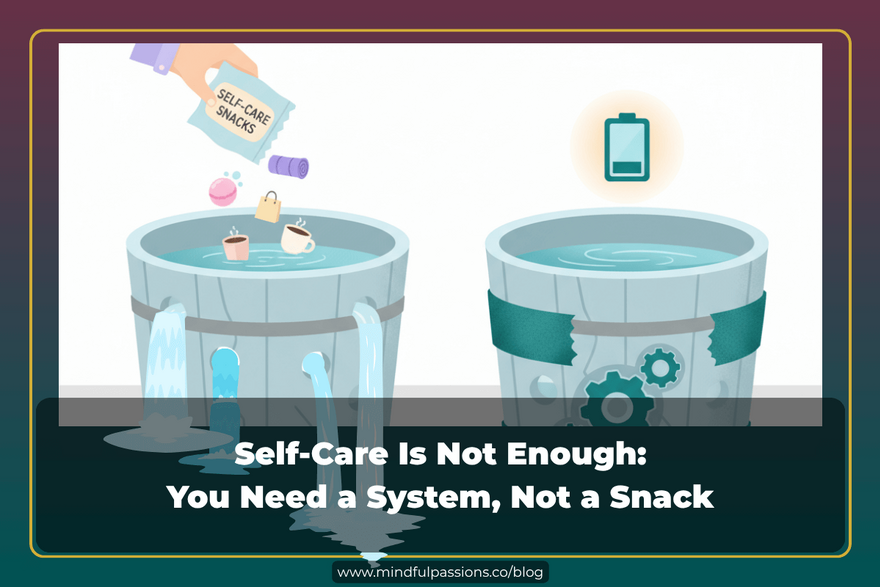
You’ve tried the bubble baths. The meditation apps. The “unplugged” weekends.
And yet—by Monday, the peace has evaporated. You’re right back in the same cycle of exhaustion.
That’s not because you’re doing self-care wrong. It’s because self-care alone isn’t enough.
What you need isn’t another snack. You need a system.
👉🏾 Looking for the bigger picture? Check the Boundary OS Hub to see how this post fits into the full system.
The Self-Care Trap
Self-care is important. No question. But it was never designed to carry the weight of your entire capacity.
Here’s the problem:
- You use self-care to recover after you’re already drained.
- It helps for a few hours, maybe a day.
- Then you’re empty again.
That’s not restoration. That’s survival mode.
Why Your Sunday Bath Doesn’t Last Until Monday
Imagine a pipe leaking under your sink. You can mop up the water all you want, but until you fix the pipe, the flood keeps coming back.
That’s what’s happening with your energy.
Self-care is the mop. But the broken pipe is Boundary Debt—the cost of saying yes when you didn’t have the capacity.
As long as the leak keeps running, no amount of self-care will ever be enough.
Snacks vs. Systems
So what’s the difference?
Self-Care Snacks (Reactive)
These are the little boosts you grab after you’ve been drained:
- Retail therapy.
- Stress eating.
- Revenge bedtime procrastination.
- A nap that buys you two more hours.
Snacks are necessary, but they’re reactive. They ease the symptoms, but they don’t stop the drain.
Boundary Systems (Proactive)
A system is proactive. It governs how you allocate your time, energy, and attention before you’re empty.
Its job is to stop the accumulation of Boundary Debt.
A system makes sure every yes is intentional and every no is clear.
Instead of refilling a leaky bucket, you seal the holes first.
How System Failure Creates Boundary Debt
Most people run on autopilot. When a request lands, the brain skips the capacity check and defaults to the Reflexive Yes.
It’s fast, it avoids conflict, and it keeps the peace. But it also piles on invisible costs:
- Resentment → the first signal that you’re off balance.
- Distraction → the inability to focus because your plate is overloaded.
- Exhaustion → the hollow tiredness that sleep can’t fix.
This is Boundary Debt. And the longer you ignore it, the heavier it becomes.
The MPI Philosophy: A Capacity-First Approach
Here’s the shift: Stop asking “What do they need?” and start asking “What do I actually have to give?”
That single reframe changes everything.
Because your resources—Energy, Attention, Mood—are finite. Once they’re gone, they’re gone.
The MPI Boundary Systems Framework is designed to protect them.
The Three Core Tools of the MPI Framework
1. Capacity-First Decision Reflex (CFDR)
- Your new default habit. Instead of saying yes automatically, you pause and check capacity first.
2. The Resentimeter
- A 0–10 scale that turns vague feelings into data. Anything above a 2 signals a boundary step.
3. The Boundary Ladder
- Practical scripts to communicate your “no” or counteroffer clearly—without guilt.
Together, these tools shift you out of reaction mode and into intentional living.
Why a System Outperforms Snacks
Let’s break down the difference:
- Without a system: You run on autopilot, say yes reflexively, burn out, then use self-care snacks to patch the damage.
- With a system: You pause, scan your resources, and make a decision aligned with your actual capacity. You need fewer snacks because the leaks are sealed.
The result? When you do take a bath or unplug for the weekend, the effects actually stick.
A Real-Life Example
It’s Friday. Your coworker emails: “Can you cover this client call for me?”
- Without a system: You say yes. You’re resentful all weekend. You try to reset with Netflix, wine, and a bath. By Monday, you’re still drained.
- With a system: You pause. Resentimeter hits 4 (frustration). Your energy is at 5 (yellow). You propose instead: “I can’t cover the full call, but I can review the notes afterward.”
Result? You honor your limits and still support your coworker—without the Boundary Debt.
Building Self-Trust Through Structure
The most powerful thing a system gives you isn’t just energy. It’s self-trust.
Every time you override your own needs, you reinforce the belief: “I can’t count on myself.”
But when you use a system to protect your limits, you prove to yourself over and over: “I can be trusted to take care of me.”
That trust is the foundation of sustainable energy.
End Game: Upgrade Your Operating System
Stop blaming yourself for needing more than a Sunday bath.
Your exhaustion isn’t laziness. It’s a system failure.
Snacks can’t fix leaks. You need a system that seals them — so your energy, attention, and mood are protected at the source.
The MPI Boundary Systems Framework is that operating system.
Next up: in Spotting the Secret Signs of Boundary Overload Before You Explode, you’ll learn the early warning signals that show you when your system is under strain — and how to catch overload before it takes you down.

Comments